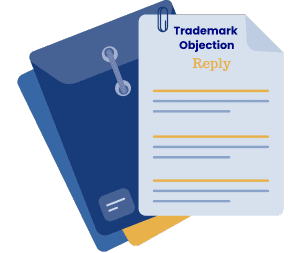Trademark Objection? Don't Panic. We'll Secure Your Brand.
Get Your Brand Back on Track Today.
- Trademark objection got you stuck? Don't worry, Musecorp has the solution to protect your brand.
- OR
- Check Pricing
Free Consultation
Book Appointment
- 4.9/5 Google Review
- 100% satisfaction is guaranteed.
- Nationwide Coverage

Trademark Objections: A Hurdle, Not a Dead End – Navigate with Confidence with Musecorp
Trademark registration in India is a vital step in establishing and protecting your brand identity. However, the process is not always straightforward. A trademark objection can arise, potentially delaying or even jeopardizing your application.
At Musecorp, we specialize in helping businesses overcome these challenges, ensuring your brand’s journey remains on track.
Our team of seasoned IP lawyers and Chartered Accountants brings expertise and a proven track record to help you navigate the complexities of trademark objections and secure the protection your brand deserves.

The Critical Importance of a Trademark Objection Reply
A trademark objection is a communication from the Trademarks Registry, highlighting potential issues or conflicts with your trademark application. While it can feel like a setback, it's crucial to remember that an objection is not a final rejection. It's an opportunity to address any concerns and strengthen your case for registration.

Response to a trademark objection, known as a trademark objection reply, is pivotal. A well-crafted and legally sound reply can:
- Overcome Obstacles: By directly addressing the examiner's concerns, you demonstrate the validity and distinctiveness of your mark.
- Save Time and Money: Prevent costly delays and potential outright rejection, keeping your brand protection efforts on schedule.
- Strengthen Your Brand: Show your commitment to protecting your intellectual property, building trust with consumers and stakeholders.
At Musecorp, our legal experts handle these challenges, ensuring your renewal process is smooth and worry-free.
Type of Trademark Objections:
When navigating the trademark registration process in India, it’s essential to be aware of the two primary grounds upon which the Trademarks Registry may raise objections: Absolute Grounds and Relative Grounds. Each ground encompasses specific criteria that your trademark application must meet to secure registration.

Absolute Grounds: Focusing on the Inherent Nature of the Mark
Absolute grounds for refusal pertain to the inherent characteristics of the mark itself, and if any of these criteria are met, your trademark application may face rejection. Some common reasons for objections under absolute grounds include:
- Lack of Distinctiveness: Your mark may be deemed too generic or descriptive to function effectively as a trademark. For example, attempting to register “Fresh Juice” for a juice brand may be rejected because it directly describes the product.
- Deceptiveness: If your mark misrepresents the goods or services you offer, it may be considered deceptive. For instance, using “Organic” for a product that contains non-organic ingredients could lead to an objection.
- Offensive or Immoral Content: Marks that are offensive, obscene, or contrary to public morality will be refused registration. This includes marks that may hurt religious sentiments or contain scandalous elements.

Relative Grounds: Considering Conflicts with Existing Trademarks
Relative grounds for refusal come into play when your trademark application clashes with existing registered or pending trademarks. The primary concern here is the likelihood of confusion among consumers. Some typical scenarios leading to objections under relative grounds include:
- Similarity to Existing Marks: If your mark is too similar to an already registered trademark for similar goods or services, it could cause confusion among consumers regarding the origin of the products. This includes similarities in appearance, sound, or meaning.
- Identical Marks: If your mark is identical to an existing registered trademark for identical or similar goods or services, it’s highly likely to face objection.
- Well-Known Marks: Even if your mark is not identical or similar, it may still be objected to if it’s too close to a well-known trademark, regardless of the goods or services involved. This is to prevent dilution or tarnishment of the well-known mark’s reputation.
Understanding these absolute and relative grounds is essential for anyone seeking trademark registration in India. It enables you to anticipate potential objections and take proactive steps to strengthen your application, increasing your chances of success.
Some common reasons for trademark objections include:

Similarity to Existing Marks
Your mark might be too close to another registered trademark, potentially leading to consumer confusion.

Lack of Distinctiveness
Your mark may be deemed too generic or descriptive to function effectively as a trademark.

Deceptive Nature
Your mark might misrepresent the goods or services you offer, misleading consumers.
How Musecorp Navigates Your Trademark Objection Reply Process

Detailed Review of Examination Report:
As soon as we receive your examination report, our team of experienced IP professionals thoroughly reviews it. We break down the examiner's concerns, explaining the legal terms in simple language, and identify the specific reasons for the objection.

Addressing the Objections:
Whether the objection is based on absolute grounds (issues with the trademark itself), relative grounds (conflict with existing trademarks), or both, we carefully analyze it. Our experience helps us anticipate challenges and prepare a solid response, improving your chances of success.

Tailored Strategy Development:
We work closely with you to understand your brand and business objectives. Instead of using a standard approach, we create a custom strategy based on your unique situation, combining legal expertise and industry knowledge to tackle each objection effectively.

Crafting a Strong Reply:
Our skilled team of IP lawyers and Chartered Accountants carefully drafts your trademark objection reply. We use clear, persuasive language to respond to each point raised by the examiner, demonstrating the strength and distinctiveness of your trademark.

Timely Submission & Communication:
We make sure your reply is filed within the required timeframe, avoiding any delays. Throughout the process, we keep you updated, providing expert guidance and maintaining open communication.

Next Steps & Ongoing Support:
We closely monitor the examiner's decision and keep you informed of any updates. If the objection isn’t fully resolved, we are ready to represent you at a hearing or explore further options to secure your trademark.
Documents Required for filing Trademark Objection Reply
Trademark Examination Report
This is the official notice from the Trademarks Registry detailing the objections. It helps you understand the examiner’s concerns so you can address them properly.
Trademark Application Number
This is your unique application number, which you’ll need to reference throughout the objection reply process.
Authorization Letter (TM-48)
Lorem ipsum dolor sit amet, consectetur adipiscing elit. Ut elit tellus, luctus nec ullamcorper mattis, pulvinar dapibus leo.
Additional Supporting Documents
Affidavit of Use/Non-Use
This is the official notice from the Trademarks Registry detailing the objections. It helps you understand the examiner’s concerns so you can address them properly.
Evidence of Use
This is your unique application number, which you’ll need to reference throughout the objection reply process.
Evidence of Use
This is your unique application number, which you’ll need to reference throughout the objection reply process.
Proof of Acquired Distinctiveness
Lorem ipsum dolor sit amet, consectetur adipiscing elit. Ut elit tellus, luctus nec ullamcorper mattis, pulvinar dapibus leo.
Expert Opinions/Market Research
Lorem ipsum dolor sit amet, consectetur adipiscing elit. Ut elit tellus, luctus nec ullamcorper mattis, pulvinar dapibus leo.
Relevant Case Law/Precedents
This is your unique application number, which you’ll need to reference throughout the objection reply process.
Why choose Musecorp Legal Solutions for Trademark Renewal Service?
Expertise You Can Trust
Our team of experienced trademark attorneys and IP professionals understands the complexities of trademark objections. We combine legal knowledge with practical experience to give your case the best chance of success.
Tailored Solutions
We know that every objection is unique. That’s why we create customized strategies based on the specific objections, your brand's goals, and the legal requirements, ensuring a precise and personalized response.
Transparent Pricing
We offer clear, affordable pricing with no hidden costs. Our Essential and Premium packages are designed to cater to various levels of objections, making it easy for you to choose what works best for your needs.
Quick & Timely Action
We understand the urgency in responding to trademark objections. Our streamlined process ensures that your reply is prepared and submitted on time, avoiding unnecessary delays that could affect your application.
Comprehensive Support
From analysing the examination report to drafting a compelling reply, we handle every step of the process. We also keep you informed with timely updates and are always available for any questions or concerns.
Pricing for Trademark Renewal
At Musecorp, we offer two flexible packages to help you respond to trademark objections quickly and efficiently. Choose the one that fits your needs and budget.

Essential Plan
INR 14,999
Includes:
- Comprehensive Examination Report Review
- Trademark Objection Reply Drafting
- Submission within the Deadline
- Email Support for Updates and Queries

Premium Plan
INR 21,999
Includes:
- Detailed Examination Report Analysis
- Custom Reply Draft with Strong Legal Arguments
- Supporting Documents (e.g., Affidavit of Use, Evidence of Distinctiveness)
- Submission and Follow-up
- Phone and Email Support
Custom Plan
Customize your services to fit your requirements. Choose your options and receive a personalized price.
Contact us for a free consultation and customized quote.
Get in Touch
+91 8448277497
The line is open 24/7, 365 days a year.






FAQ Section
Have Questions? We've Got Answers!
What is a trademark objection?
A trademark objection is a response from the Trademark Registry when they raise concerns about your trademark application. This happens during the examination stage if the examiner finds issues with the mark based on legal grounds, prior marks, or other reasons.
Why did I receive a trademark objection?
Trademark objections are common and can occur for several reasons:
- Similarity to an existing trademark
- Descriptive or generic nature of the mark
- Incorrect or incomplete application details
- Use of prohibited terms or symbols
- Failure to meet distinctiveness requirements
How do I respond to a trademark objection?
You need to file a well-drafted trademark objection reply within the stipulated time (usually 30 days). The reply should address each objection raised, providing relevant arguments, documents, and legal reasoning to overcome the objections.
What happens if I don’t reply to a trademark objection?
If you fail to respond within the given timeframe, your trademark application will be considered abandoned, and you may lose the chance to register your trademark.
Can I handle the trademark objection reply myself?
While it’s possible to draft a reply yourself, it is highly recommended to consult with trademark professionals or lawyers who have experience handling objections. They can craft a legally sound and persuasive response, increasing your chances of approval.
What documents are needed for filing a trademark objection reply?
Some of the key documents required include:
- Trademark Examination Report
- Trademark Application Number
- Authorization Letter (if represented by an agent)
- Supporting documents (e.g., evidence of use, affidavit of use/non-use, case laws, or market research reports)
How long does it take for the objection to be resolved?
The timeline for resolving a trademark objection varies. After submitting your reply, it may take several months for the Trademark Office to review your response and provide a decision. Delays can occur if additional hearings or responses are needed.
What are the chances of overcoming a trademark objection?
Your chances depend on the nature of the objection and the strength of your response. With a well-drafted and legally sound reply, many objections can be successfully resolved.
How much does it cost to file a trademark objection reply?
At Musecorp, we offer two packages:
- Essential Package: Covers the basic reply drafting and submission process.
- Premium Package: Includes a comprehensive strategy, in-depth research, and continuous follow-up until the objection is fully resolved.
Can a trademark objection be appealed if rejected?
Yes, if your reply is unsuccessful, you may appeal the decision. This typically involves a hearing before the trademark authorities, where you can present further arguments and evidence.
How can Musecorp help with my trademark objection reply?
Musecorp provides end-to-end trademark objection reply services. From reviewing the examination report to drafting a legally robust reply, we ensure every step is handled with expertise. Our team of trademark lawyers and IP professionals work to maximize your chances of approval.
What are the common grounds for trademark objections in India?
Trademark objections in India are usually raised on:
- Absolute grounds (e.g., if the mark lacks distinctiveness or is descriptive)
- Relative grounds (e.g., conflicts with existing registered trademarks)
If you have more questions or need help with your trademark objection reply, Contact Us Today for expert guidance!
